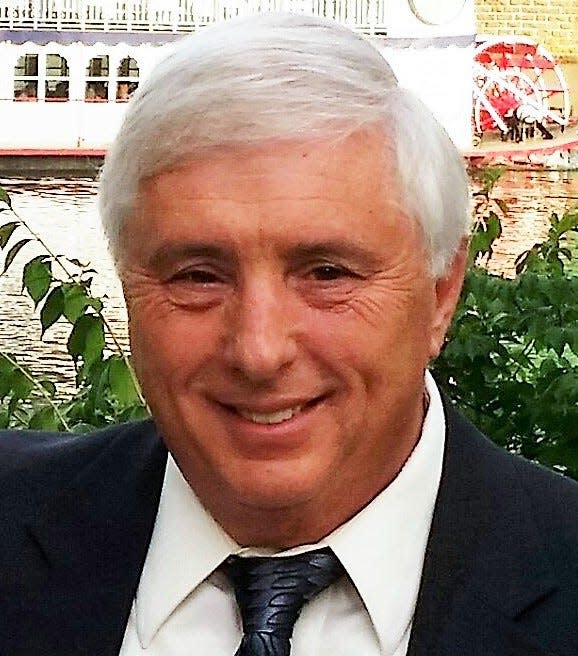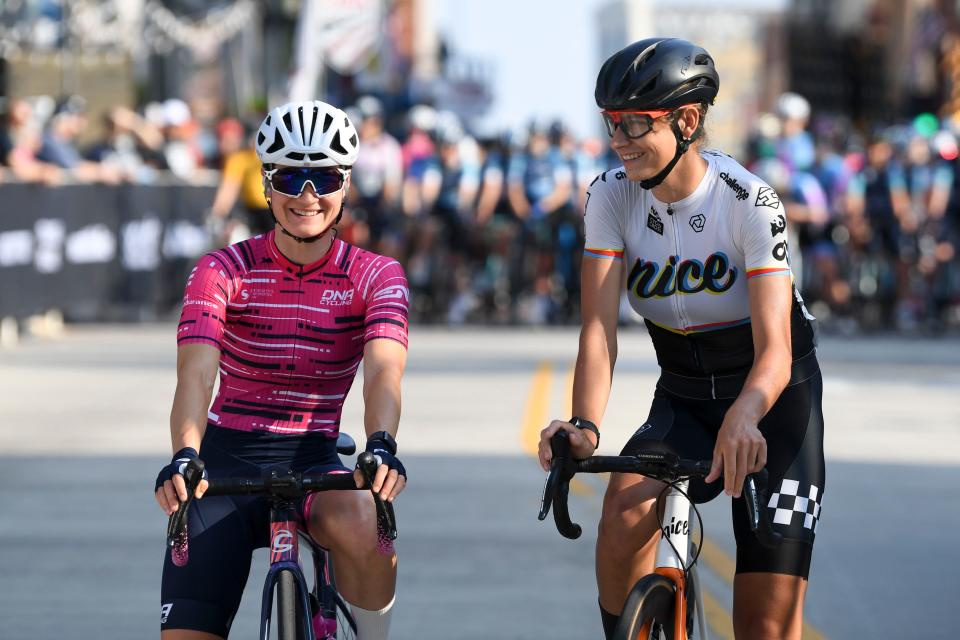Opinion: Transgender athletes pose a threat to women's rights in sports | George Korda
- Oops!Something went wrong.Please try again later.
In conversations about transgender athletes competing in women's sports, many transgender advocates and some sports organizations maintain that when a male identifies as a female, it must be accepted without discussion, including competing against women and girls. Anything else is discrimination.
Not everyone agrees, among them many women who competed at the 2023 USA Cycling Pro Road National Championships, held June 22-25 in Knoxville. “Keep Women’s Cycling Female” was the theme of a rally held June 25 at Pat Summit Plaza on the University of Tennessee campus.
The case of Lia Thomas, a University of Pennsylvania swimmer, elevated the issue of transgender athletes in women’s sports to new national heights. Swimming World magazine explored the subject in an April 2022 article by the publication’s editor-in-chief: “A Look at the Numbers and Times: There’s no Denying the Advantages of Lia Thomas.”

It included this: “The numbers paint a clear picture. The fact that the University of Pennsylvania swimmer soared from a mid-500s ranking (554th in the 200 freestyle; all divisions) in men’s competition to one of the top-ranked swimmers in women’s competition tells the story of the unfairness which unfolded at the NCAA level.”
The loss of women's sports?
In the water or on the land, more women are speaking out about what they see as the unfairness inherent in transgender athletes competing against those born female – and fear the loss of women’s sports if enough men transition and participate.
The “Keep Women’s Cycling Female” event in Knoxville featured some of America’s top women cyclists. Among the cycling competitors and rally speakers was Inga Thompson, a 10-time U.S. national champion, three-time Olympian, three-time World Championship medalist and two-time podium finisher at the Tour de France.

Said Thompson in a news release prior to the event: “Women’s sports were created for women. Women fought for years to have sex-separated sports. No amount of testosterone suppression mitigates the advantages of being born male. Sports exist on the premise of fairness. There is no fairness or equal opportunity in sports for women if men with gender dysphoria are allowed to compete against women.”
Thomas has paid a price for her stand. Along with what she says have been threats made against her, her statements on behalf of women cost her a high-level role with the Union Cycliste Internationale. In May the UCI, the international governing body of cycling, kicked her off its board of directors for anti-trans comments.
Coverage of a volleyball player's story
Another rally speaker was Payton McNabb, a former North Carolina high school volleyball player. McNabb spoke in April to the North Carolina legislature in favor of the Fairness in Women’s Sports Act, subsequently passed by the Republican-controlled legislature but vetoed by Roy Cooper, the state’s Democratic governor.
The top of a girls’ competitive volleyball net is 7 feet, 4.25 inches. For men, it’s 7 feet, 11 and ⅝ inches. There’s a reason for the difference: most men are taller and jump higher. In October 2022, McNabb was hit in the face by a ball spiked by a transgender opponent. But was the opponent transgender? It’s a challenge to tell given some of the reporting of her experience.
An example of this slipshod-to-agenda-driven reporting on McNabb’s case is illustrated in WTVC-TV, Chattanooga, and CBS Austin, Texas, stories on her appearance before the North Carolina legislature. WTVC’s story within the first few sentences said: “Hiwassee Dam High School volleyball player in North Carolina is speaking out about injuries she suffered last fall from an opponent she claims is transgender. … Back in October senior Payton McNabb said another player, who she claims is transgender, spiked the ball, which hit her in the head.”
It isn’t until the story’s end it’s said neither the North Carolina High School Athletic Association nor the player’s school would confirm the other player was transgender. Why not? It’s not stated. But the twice-referenced McNabb “claims” are high in the story.
The CBS Austin story, datelined Raleigh, N.C., began as follows: “A high school volleyball player who suffered severe head and neck injuries resulting in long-term concussion symptoms after a girl she says is transgender spiked a ball in her face is now speaking out publicly for the first time.”
Note the “says is transgender.” The opponent either is or isn’t transgender. McNabb’s “claims” are not the issue. Before running such a story, a reporter’s job should be to pick up the phone, use email to get confirmation or a denial – something – that the other player is transgender. It doesn’t matter if the story originates from another city or state. But the appearance is given that McNabb might not know what she’s talking about. That’s an utter reporting failure. Or decision. Or both?
Not until the final paragraph of the CBS Austin story is it said that after McNabb was hurt, the school district halted all competition between “the school's volleyball team that allowed a transgender person to play and the rest of the volleyball teams within the school district.” If that’s the case, what was the basis for the first-paragraph wording that McNabb “says” the other player is transgender? An utter reporting failure? A decision? Or both?
News coverage without objectivity becomes a form of propaganda, even if unintentional.
As with Thompson, women who speak out on transgender athletes competing in women’s sports – even if they’re internationally famous stars – are often vilified. For example, in 2019, women’s tennis great Martina Navratilova was dropped from her role as an ambassador and advisory board member of Athlete Ally, a nonprofit organization that advocates for LGBTQ “inclusion and equality” in sports. Her offense? Making “transphobic” comments,
Hear more Tennessee voices: Get the weekly opinion newsletter for insightful and thought-provoking columns.
Where are the women's advocacy groups?
An inescapable question on this subject is why women’s advocacy groups are not lining up in support of women who want to compete against women. Two theories: They have friends they don’t want to upset or they’ve spent so many years saying that women are equal to men in everything that they can’t now acknowledge what these women are asking be acknowledged, that men and women are different.
There is a good deal of societal advocacy for transgender rights. But what are the rights of women and girls who see this as unfair and a threat to their sports?
As more transgender athletes compete against women, there are two main outcomes: either the proponents of transgender participants in women’s sports will outlast and ultimately defeat their opponents, or enough women and girls will decide they’ve had enough, will roar in numbers too big to ignore, and policies will be made in their favor.
Who do you think will prevail?
George Korda is a political analyst for WATE-TV, hosts “State Your Case” from noon to 2 p.m. Sundays on WOKI-FM Newstalk 98.7 and is president of Korda Communications, a public relations and communications consulting firm.
This article originally appeared on Knoxville News Sentinel: Opinion: Transgender athletes in women’s sports | George Korda

